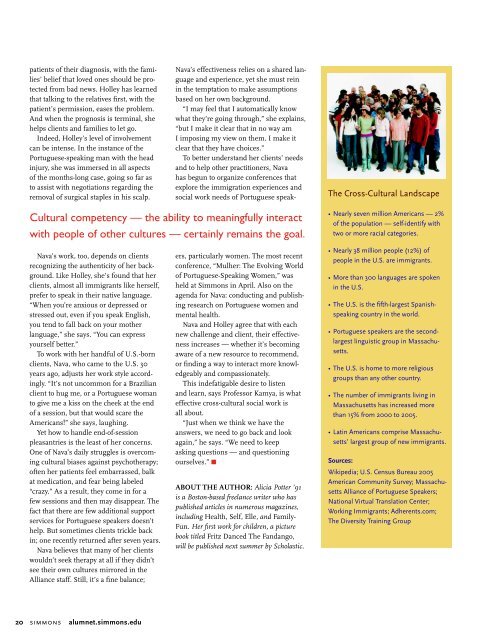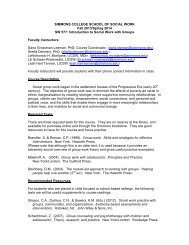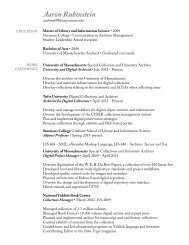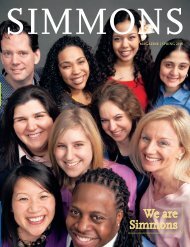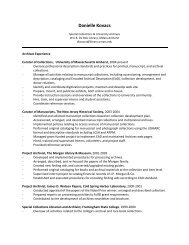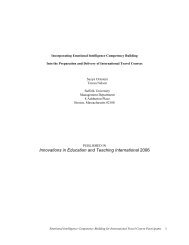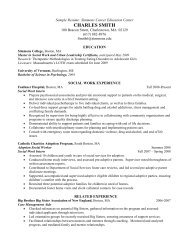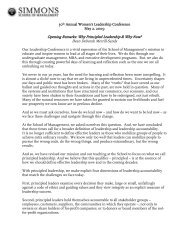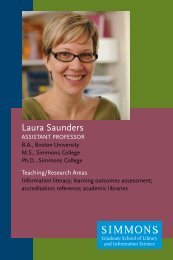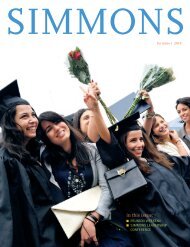GSLIS Edition - Simmons College
GSLIS Edition - Simmons College
GSLIS Edition - Simmons College
You also want an ePaper? Increase the reach of your titles
YUMPU automatically turns print PDFs into web optimized ePapers that Google loves.
patients of their diagnosis, with the families’<br />
belief that loved ones should be protected<br />
from bad news. Holley has learned<br />
that talking to the relatives first, with the<br />
patient’s permission, eases the problem.<br />
And when the prognosis is terminal, she<br />
helps clients and families to let go.<br />
Indeed, Holley’s level of involvement<br />
can be intense. In the instance of the<br />
Portuguese-speaking man with the head<br />
injury, she was immersed in all aspects<br />
of the months-long case, going so far as<br />
to assist with negotiations regarding the<br />
removal of surgical staples in his scalp.<br />
The Cross-Cultural Landscape<br />
Cultural competency — the ability to meaningfully interact<br />
with people of other cultures — certainly remains the goal.<br />
• Nearly seven million Americans — 2%<br />
of the population — self-identify with<br />
two or more racial categories.<br />
Nava’s work, too, depends on clients<br />
recognizing the authenticity of her background.<br />
Like Holley, she’s found that her<br />
clients, almost all immigrants like herself,<br />
prefer to speak in their native language.<br />
“When you’re anxious or depressed or<br />
stressed out, even if you speak English,<br />
you tend to fall back on your mother<br />
language,” she says. “You can express<br />
yourself better.”<br />
To work with her handful of U.S.-born<br />
clients, Nava, who came to the U.S. 30<br />
years ago, adjusts her work style accordingly.<br />
“It’s not uncommon for a Brazilian<br />
client to hug me, or a Portuguese woman<br />
to give me a kiss on the cheek at the end<br />
of a session, but that would scare the<br />
Americans!” she says, laughing.<br />
Yet how to handle end-of-session<br />
pleasantries is the least of her concerns.<br />
One of Nava’s daily struggles is overcoming<br />
cultural biases against psychotherapy;<br />
often her patients feel embarrassed, balk<br />
at medication, and fear being labeled<br />
“crazy.” As a result, they come in for a<br />
few sessions and then may disappear. The<br />
fact that there are few additional support<br />
services for Portuguese speakers doesn’t<br />
help. But sometimes clients trickle back<br />
in; one recently returned after seven years.<br />
Nava believes that many of her clients<br />
wouldn’t seek therapy at all if they didn’t<br />
see their own cultures mirrored in the<br />
Alliance staff. Still, it’s a fine balance;<br />
Nava’s effectiveness relies on a shared language<br />
and experience, yet she must rein<br />
in the temptation to make assumptions<br />
based on her own background.<br />
“I may feel that I automatically know<br />
what they’re going through,” she explains,<br />
“but I make it clear that in no way am<br />
I imposing my view on them. I make it<br />
clear that they have choices.”<br />
To better understand her clients’ needs<br />
and to help other practitioners, Nava<br />
has begun to organize conferences that<br />
explore the immigration experiences and<br />
social work needs of Portuguese speakers,<br />
particularly women. The most recent<br />
conference, “Mulher: The Evolving World<br />
of Portuguese-Speaking Women,” was<br />
held at <strong>Simmons</strong> in April. Also on the<br />
agenda for Nava: conducting and publishing<br />
research on Portuguese women and<br />
mental health.<br />
Nava and Holley agree that with each<br />
new challenge and client, their effectiveness<br />
increases — whether it’s becoming<br />
aware of a new resource to recommend,<br />
or finding a way to interact more knowledgeably<br />
and compassionately.<br />
This indefatigable desire to listen<br />
and learn, says Professor Kamya, is what<br />
effective cross-cultural social work is<br />
all about.<br />
“Just when we think we have the<br />
answers, we need to go back and look<br />
again,” he says. “We need to keep<br />
asking questions — and questioning<br />
ourselves.” <br />
ABOUT THE AUTHOR: Alicia Potter ’91<br />
is a Boston-based freelance writer who has<br />
published articles in numerous magazines,<br />
including Health, Self, Elle, and Family-<br />
Fun. Her first work for children, a picture<br />
book titled Fritz Danced The Fandango,<br />
will be published next summer by Scholastic.<br />
• Nearly 38 million people (12%) of<br />
people in the U.S. are immigrants.<br />
• More than 300 languages are spoken<br />
in the U.S.<br />
• The U.S. is the fi fth-largest Spanishspeaking<br />
country in the world.<br />
• Portuguese speakers are the secondlargest<br />
linguistic group in Massachusetts.<br />
• The U.S. is home to more religious<br />
groups than any other country.<br />
• The number of immigrants living in<br />
Massachusetts has increased more<br />
than 15% from 2000 to 2005.<br />
• Latin Americans comprise Massachusetts’<br />
largest group of new immigrants.<br />
Sources:<br />
Wikipedia; U.S. Census Bureau 2005<br />
American Community Survey; Massachusetts<br />
Alliance of Portuguese Speakers;<br />
National Virtual Translation Center;<br />
Working Immigrants; Adherents.com;<br />
The Diversity Training Group<br />
20 simmons alumnet.simmons.edu


